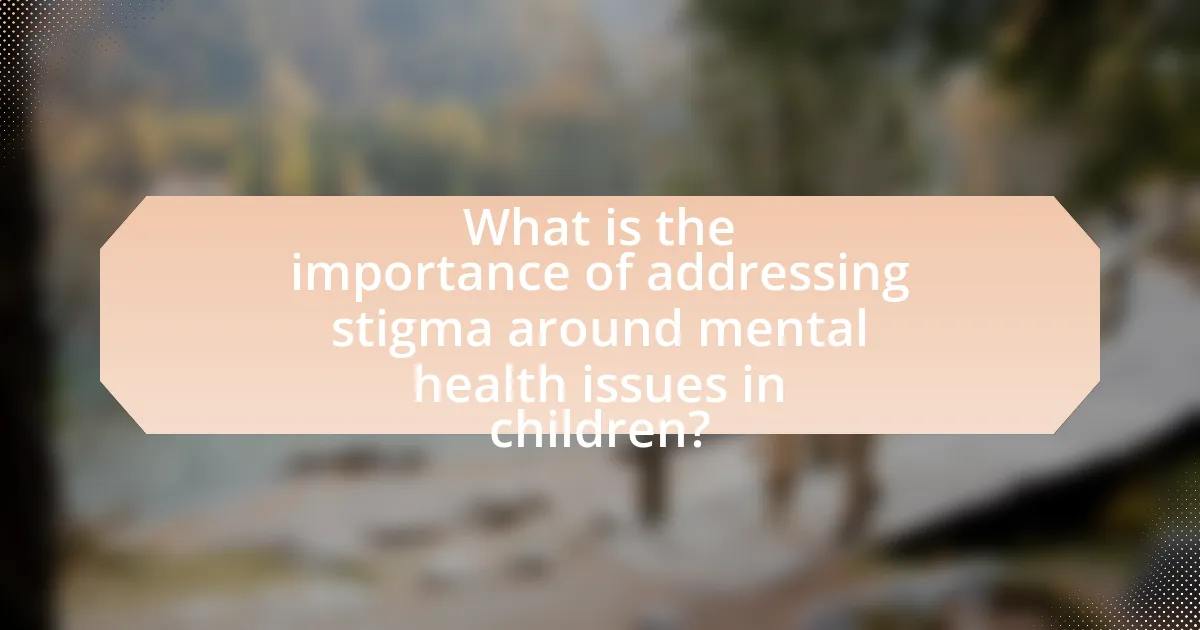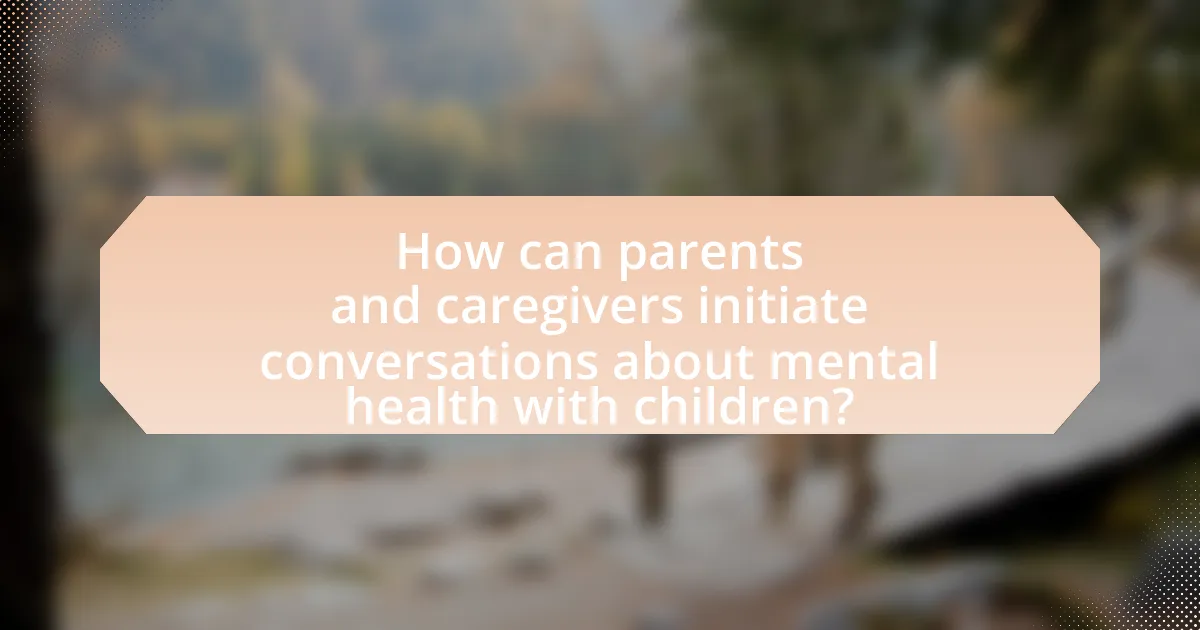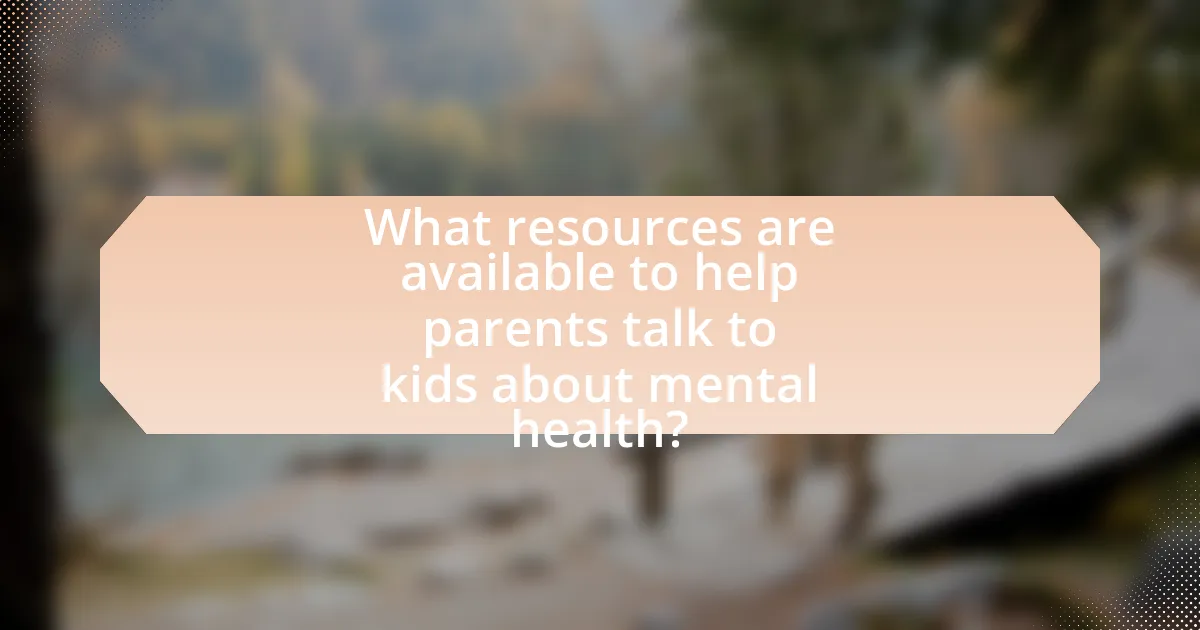The article focuses on the importance of addressing stigma surrounding mental health issues in children and provides strategies for parents and caregivers to facilitate open discussions. It highlights how stigma can lead to negative outcomes such as social isolation and low self-esteem, while emphasizing the need for accurate mental health education to combat misconceptions. Key topics include the impact of stigma on children’s understanding of mental health, the benefits of open conversations, and practical tips for initiating discussions about mental health in a supportive environment. The article also outlines available resources and the role of schools in promoting mental health awareness.

What is the importance of addressing stigma around mental health issues in children?
Addressing stigma around mental health issues in children is crucial for fostering a supportive environment that encourages open dialogue and access to necessary resources. When stigma is reduced, children are more likely to seek help, leading to early intervention and better mental health outcomes. Research indicates that children who experience stigma are at a higher risk for social isolation, lower self-esteem, and worsening mental health conditions. For instance, a study published in the Journal of Child Psychology and Psychiatry found that stigma can significantly hinder children’s willingness to discuss their feelings and seek professional help, ultimately impacting their overall well-being.
How does stigma affect children’s understanding of mental health?
Stigma negatively impacts children’s understanding of mental health by fostering misconceptions and fear surrounding mental health issues. Children exposed to stigma may internalize negative beliefs, leading to confusion about mental health conditions and discouraging them from seeking help or discussing their feelings. Research indicates that children who perceive mental health stigma are less likely to recognize mental health problems as legitimate and may develop prejudiced attitudes towards peers with such issues, as shown in a study published in the Journal of Child Psychology and Psychiatry by authors including Pescosolido et al. This lack of understanding can hinder their emotional development and contribute to a cycle of silence and misunderstanding regarding mental health.
What are the common misconceptions children have about mental health?
Children commonly believe that mental health issues are a sign of weakness or that individuals with mental health conditions can simply “snap out of it.” These misconceptions stem from a lack of understanding and exposure to mental health education. Research indicates that children often equate mental health problems with personal failure, which can lead to stigma and reluctance to seek help. For instance, a study published in the Journal of Child Psychology and Psychiatry found that children who hold these misconceptions are less likely to support peers with mental health challenges, reinforcing the need for accurate mental health education.
How can stigma lead to negative outcomes for children?
Stigma can lead to negative outcomes for children by causing them to experience social isolation, low self-esteem, and reluctance to seek help for mental health issues. When children are stigmatized, they may internalize negative beliefs about themselves, which can result in anxiety and depression. Research indicates that children who face stigma related to mental health are less likely to engage in supportive peer relationships and more likely to experience bullying, further exacerbating their mental health challenges. A study published in the Journal of Child Psychology and Psychiatry found that stigma significantly correlates with increased emotional distress and decreased willingness to access mental health services among affected youth.
Why is it essential to talk to kids about mental health issues?
Talking to kids about mental health issues is essential because it fosters understanding and reduces stigma. Open discussions help children recognize and articulate their feelings, promoting emotional intelligence. Research indicates that early conversations about mental health can lead to better coping strategies and resilience in children, as evidenced by a study published in the Journal of the American Academy of Child & Adolescent Psychiatry, which found that children who engage in mental health discussions are more likely to seek help when needed. By addressing mental health openly, caregivers can create a supportive environment that encourages children to express their concerns without fear of judgment.
What are the benefits of open conversations about mental health?
Open conversations about mental health reduce stigma and promote understanding. By discussing mental health openly, individuals can normalize these conversations, making it easier for those struggling to seek help. Research indicates that open dialogue can lead to increased awareness and empathy, as evidenced by a study published in the Journal of Health Communication, which found that communities with open discussions about mental health reported lower levels of stigma and higher rates of individuals seeking treatment. Furthermore, these conversations can foster supportive environments, encouraging individuals to share their experiences and feelings, ultimately leading to improved mental well-being.
How can discussing mental health promote emotional well-being?
Discussing mental health promotes emotional well-being by fostering open communication and reducing stigma. When individuals engage in conversations about mental health, they create an environment where feelings and experiences can be shared without fear of judgment. This openness encourages individuals to seek help and support, which is crucial for emotional resilience. Research indicates that children who learn to discuss their emotions and mental health are better equipped to manage stress and anxiety, leading to improved overall mental health outcomes. For instance, a study published in the Journal of Child Psychology and Psychiatry found that children who openly discuss their feelings are less likely to experience depression and anxiety later in life. Thus, discussing mental health not only normalizes the conversation but also empowers individuals to prioritize their emotional well-being.

How can parents and caregivers initiate conversations about mental health with children?
Parents and caregivers can initiate conversations about mental health with children by creating a safe and open environment for discussion. This can be achieved by using age-appropriate language, asking open-ended questions, and actively listening to the child’s thoughts and feelings. Research indicates that children are more likely to engage in discussions about mental health when they feel supported and understood, which helps reduce stigma and promotes emotional well-being. For example, a study published in the Journal of Child Psychology and Psychiatry found that children who have open dialogues about emotions with their caregivers are better equipped to manage stress and anxiety.
What strategies can be used to start the conversation?
To start the conversation about mental health issues with kids, use open-ended questions that encourage dialogue, such as “What do you think about how people feel when they are sad?” This approach invites children to express their thoughts and feelings, creating a safe space for discussion. Additionally, sharing relatable stories or examples can help normalize the topic, making it easier for children to engage. Research indicates that children are more likely to open up when they feel understood and supported, reinforcing the effectiveness of these strategies in addressing stigma around mental health.
How can parents create a safe space for discussion?
Parents can create a safe space for discussion by actively listening and validating their children’s feelings. This approach encourages open communication, allowing children to express their thoughts without fear of judgment. Research indicates that children who feel heard are more likely to share their concerns, particularly regarding sensitive topics like mental health. For instance, a study published in the Journal of Child Psychology and Psychiatry found that supportive parenting significantly reduces stigma and promotes mental well-being in children. By fostering an environment of trust and understanding, parents can effectively facilitate discussions about mental health issues.
What age-appropriate language should be used when discussing mental health?
Age-appropriate language for discussing mental health with children includes simple, clear terms that they can understand, such as “feelings,” “sad,” “worried,” and “help.” Using relatable examples, such as describing emotions like happiness or sadness in the context of everyday experiences, helps children grasp these concepts. Research indicates that children as young as five can understand basic emotional vocabulary, which supports the use of straightforward language to foster open conversations about mental health. This approach not only normalizes discussions but also encourages children to express their feelings and seek help when needed.
How can parents address children’s questions about mental health issues?
Parents can address children’s questions about mental health issues by providing clear, age-appropriate information and fostering an open dialogue. Engaging in conversations about mental health helps normalize the topic and reduces stigma, as studies show that open discussions can lead to better understanding and acceptance among children. For instance, research published in the Journal of Child Psychology and Psychiatry indicates that children who have supportive conversations about mental health are more likely to express their feelings and seek help when needed. By actively listening and validating their children’s feelings, parents can create a safe environment that encourages ongoing discussions about mental health.
What common questions might children ask about mental health?
Children commonly ask questions about mental health such as “What is mental health?”, “Why do people feel sad or anxious?”, “Is it okay to talk about my feelings?”, and “Can mental health problems be fixed?”. These inquiries reflect their curiosity and concern about emotional well-being. Research indicates that children are increasingly aware of mental health issues, with studies showing that 1 in 5 children experience mental health challenges, highlighting the importance of addressing their questions to reduce stigma and promote understanding.
How should parents respond to children’s concerns about mental health?
Parents should respond to children’s concerns about mental health by actively listening and validating their feelings. This approach fosters an open dialogue, allowing children to express their emotions without fear of judgment. Research indicates that children who feel heard are more likely to discuss their mental health issues, which can lead to early intervention and support. For instance, a study published in the Journal of Child Psychology and Psychiatry found that children who perceive their parents as supportive are less likely to experience anxiety and depression. By engaging in conversations, asking open-ended questions, and providing reassurance, parents can create a safe environment that encourages children to share their mental health concerns.

What resources are available to help parents talk to kids about mental health?
Resources available to help parents talk to kids about mental health include educational websites, books, and community programs. Websites like the National Alliance on Mental Illness (NAMI) provide guides and articles specifically designed for parents to facilitate conversations about mental health. Books such as “The Kids’ Guide to Staying Awesome and In Control” by Lauren Brukner offer practical strategies for discussing emotions and mental health with children. Additionally, community programs often host workshops or support groups that equip parents with the tools and language needed to address mental health topics effectively. These resources are validated by mental health professionals who emphasize the importance of open dialogue in reducing stigma and promoting understanding.
What types of educational materials can assist in these conversations?
Educational materials that can assist in conversations about mental health issues with kids include age-appropriate books, interactive activities, and multimedia resources. Age-appropriate books, such as “The Invisible String” by Patrice Karst, help children understand emotional connections and mental health concepts. Interactive activities, like role-playing scenarios, allow children to practice discussing feelings and mental health in a safe environment. Multimedia resources, including videos and podcasts designed for children, can present mental health topics in an engaging manner, making the information more relatable and easier to understand. These materials are effective because they provide relatable contexts and foster open dialogue, which is essential for addressing stigma surrounding mental health.
How can books and media be used to facilitate discussions?
Books and media can facilitate discussions by providing relatable narratives and characters that help children understand complex mental health issues. For instance, children’s literature often features stories that depict characters facing challenges similar to those experienced by individuals with mental health conditions, allowing young readers to empathize and engage in conversations about feelings and behaviors. Research indicates that using story-based approaches can enhance emotional literacy and reduce stigma; a study published in the Journal of Child Psychology and Psychiatry found that children exposed to stories about mental health were more likely to express understanding and compassion towards peers facing similar issues. Thus, books and media serve as effective tools for initiating and guiding discussions about mental health among children.
What role do schools play in educating children about mental health?
Schools play a crucial role in educating children about mental health by providing a structured environment for learning and support. They implement mental health curricula that teach students about emotional well-being, coping strategies, and the importance of seeking help. Research indicates that when schools incorporate mental health education, such as programs developed by the National Alliance on Mental Illness, students demonstrate increased awareness and reduced stigma surrounding mental health issues. Additionally, schools often provide access to counselors and mental health resources, fostering a supportive atmosphere where students feel safe to discuss their feelings and challenges. This proactive approach not only enhances students’ understanding of mental health but also promotes a culture of empathy and support within the school community.
How can parents model healthy attitudes towards mental health?
Parents can model healthy attitudes towards mental health by openly discussing their own feelings and mental health experiences. This practice normalizes conversations about mental health, demonstrating to children that it is acceptable to express emotions and seek help when needed. Research indicates that children who observe their parents discussing mental health positively are more likely to adopt similar attitudes, reducing stigma and promoting emotional well-being. For instance, a study published in the Journal of Child Psychology and Psychiatry found that parental openness about mental health significantly influences children’s perceptions and attitudes towards mental health issues.
What behaviors should parents exhibit to reduce stigma?
Parents should exhibit open communication, empathy, and education to reduce stigma surrounding mental health issues. By fostering an environment where children feel safe discussing their feelings and experiences, parents can normalize conversations about mental health. Research indicates that children who engage in open dialogues about mental health with their parents are more likely to develop positive attitudes towards mental health issues and those affected by them. Additionally, demonstrating empathy by validating children’s feelings and experiences helps to create a supportive atmosphere. Educating themselves and their children about mental health can further dismantle misconceptions and stereotypes, as informed discussions can counteract stigma effectively.
How can parents encourage empathy and understanding in their children?
Parents can encourage empathy and understanding in their children by modeling empathetic behavior and engaging in open discussions about emotions. When parents demonstrate compassion in their interactions, children learn to recognize and respond to the feelings of others. Research indicates that children who observe empathetic behavior are more likely to develop similar traits; for instance, a study published in the journal “Child Development” found that children who engage in discussions about emotions with their parents show increased emotional intelligence. Additionally, parents can facilitate empathy by encouraging their children to participate in community service or volunteer activities, which exposes them to diverse perspectives and experiences.
What practical tips can parents use to effectively communicate about mental health?
Parents can effectively communicate about mental health by fostering an open and supportive environment. This involves actively listening to their children, validating their feelings, and using age-appropriate language to discuss mental health topics. Research indicates that children who feel heard and understood are more likely to express their concerns and seek help when needed. Additionally, parents should model healthy coping strategies and share their own experiences with mental health, which can demystify the subject and reduce stigma. Studies show that open discussions about mental health can lead to increased awareness and understanding, ultimately promoting better mental health outcomes for children.